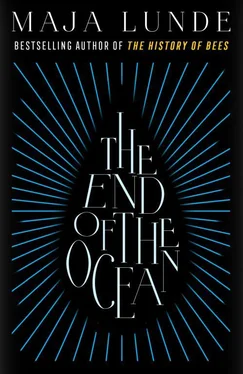I took hold of the door handle and pushed it down. The floor—the nice, clean floor—was covered with dust.
There was only an empty space where the desk had been. A clean square on a gray surface, like when a picture is removed from a wall. In the middle lay an extension cord that had been connected to the computer, dead and useless.
“They’ve left,” Lou said. “The Finders have left.”
“No, they haven’t,” I said. “I’m sure the office has just been moved somewhere else in the camp.”
*
Lou didn’t say much more as we trawled through barracks, tents and halls. I talked all the more because of it.
“Look here, here they are, I’m sure, around this corner. No, but what about this? And him, we can ask him, I’ll bet he knows something. Let’s go to the entrance, maybe they know something there. The main office, then, they must know something there at least. No, you know what, nobody knows anything here, but we can manage on our own, we can figure it out, right? We can manage on our own. We will find Mommy and August.”
I talked, not solely to keep my own spirits up, not solely to reassure her, but to hide what I saw.
Things had gotten even worse. Garbage cans filled to the brim. Clean laundry torn down from a clothesline, soiled with dirt and dust. Dirty pots thrown into a ditch. Personal possessions, a bag, two cups, a bra, a book, scattered across the ground between two barracks.
Two guards were standing in front of the warehouse, both wearing uniforms, both wearing helmets and Kevlar vests and holding machine guns. I kept talking as if they weren’t there. But Lou squeezed my hand, tightly, while looking in the other direction, neither at me nor at them.
But I don’t think she saw the very worst. Because when I discovered it, when I discovered the water tanks, I took her away from there in a hurry.
They were located in the very back of the camp and had been refilled on a daily basis. I had never seen them less than three-quarters full.
But now they were only half full of water.
I hauled Lou away.
“Wait,” she said.
“Yes,” I said. But I kept tugging.
We should leave, move on, get away from here.
But I didn’t know where to go, because the war was advancing from the south, and north of us the borders were closed.
To the west, that was the only direction open, but there lay the ocean, only the ocean.
We could leave. Try to get onto a boat.
But the ocean was many miles away. And we didn’t have any water. We couldn’t just start walking without water.
And then, the most important thing of all, Anna and August… they had to get here. We had agreed on that. Sooner or later they would have to arrive.
We had no choice but to wait.
Wait. Keep waiting.
*
I dragged Lou out of the camp with me. To the boat again, the only place where we could get away from everything.
I didn’t notice that Marguerite had followed us. I was too busy talking, shooting my mouth off to avoid having to talk about what I had seen.
We had made it a good distance down the highway when she suddenly appeared. She was out of breath, as if she had been jogging to catch up with us.
“Hi.”
She smiled. A bit shyly?
My heart beat a couple of extra beats, an idiotic teenager’s smile forced its way across my face.
“Hi!”
But I couldn’t smile at her like that, what was I doing?
“Hi,” Lou said and looked back and forth between the two of us.
“I was calling you,” Marguerite said.
“Ah,” I said.
“The Finders were gone,” Lou said.
“She means the Red Cross,” I said.
“The people who find people,” Lou said.
“But they’ve probably just relocated,” I said to Lou. “Or are taking a break.”
“Probably,” Marguerite said, without conviction.
We’d stopped and stood facing one another. Lou stared at Marguerite. I would have liked to know what the child was thinking. Had she picked up on something?
“Are you going for a walk?” Marguerite asked.
Hush, I wanted to say to Lou. Don’t say anything. But I didn’t have a chance.
“We’re going to the boat,” she said. “You can come along.”
*
Lou climbed up the ladder expertly and swung over the railing.
I let Marguerite climb after her, wondering whether she would hesitate, say it was too high, ask questions about whether the ladder was stable.
But she did none of these things.
She was wearing only a tank top. I could see the muscles tightening in her neck and back as she moved.
While I was climbing I could hear them laughing softly at something up there.
“We were waiting for you,” Lou said when I peeked over the railing. “Marguerite and I were waiting for you.”
She pulled the board off the entrance hatchway and crept down into the saloon.
“Ladies first,” I said to Marguerite and regretted it immediately.
But she smiled. The second smile of the day. “Thank you.”
It was very cramped inside. I hadn’t noticed it before when it was only Lou and me. But two adult bodies took up too much space.
Everywhere I turned, there was Marguerite. I tried to avoid contact with her, but my bare arm still brushed against hers, I could still smell the scent of her hair as she moved past.
I didn’t want physical contact with her. Didn’t want it. Though it was all I could think about, that and only that. I even imagined Lou not being here.
Anna. Anna. Jesus. What kind of a man am I, what kind of a partner, what am I doing?
Finally I sat down at the map table. There was no room for anyone else beside me there.
Lou showed Marguerite the toilet.
“Daddy says that it works, for sure,” Lou said. “He checked the pump.”
“How nice,” Marguerite said.
“But we can’t use it here,” Lou continued. “Because it will fall into the garden.”
“Gross,” Marguerite said.
“Yes, gross!” Lou laughed.
They continued chatting.
Laughing more. Enjoying themselves.
Having far too nice a time.
I turned towards the map table. Something that was covered with old plastic bags was screwed onto the wall.
I took them off, one by one. They concealed instruments. It reminded me of the control room at work. I quickly read through the names: echo sounder, VHF, GPS.
Then I discovered that the tabletop could be opened. I raised it. Nautical charts. Large transparent plastic folders containing maps.
I picked them up, spread them out before me.
White ocean, light blue along the shoreline, gray where it was the shallowest. The land was light brown, almost golden. That made sense. Dry. The ocean was covered with numbers, there were numbers everywhere. It took me a while before I understood what they represented: shallows and depths.
Along the shore the numbers were close together, in many places just one to two meters, but at sea, on the white patches, the open sea, the numbers were further apart. And it was deeper: two hundred and fifty meters, three hundred, four hundred.
How much water made up an ocean? How many liters? An ocean three hundred meters in depth, an area of one thousand square kilometers. How much water was that?
The calculations made me dizzy. An infinite amount of water. And all of it completely undrinkable.
Dead water, Thomas, my boss, used to call it. Not good for anything. You can’t water your plants with it. You can’t water yourself. Salt is death.
He had been proud of the job he did. And his pride was infectious. “Salt water is the future, David. Water into wine is all well and good, but what we’re doing is even better. We are the magicians of tomorrow.”
Читать дальше










